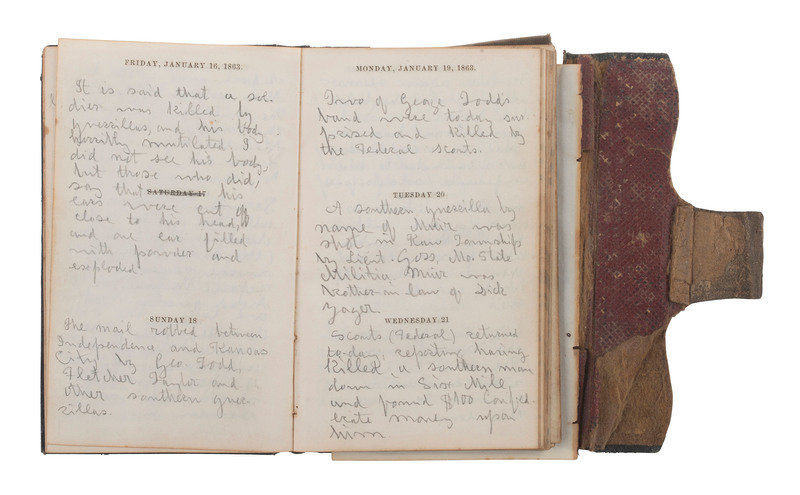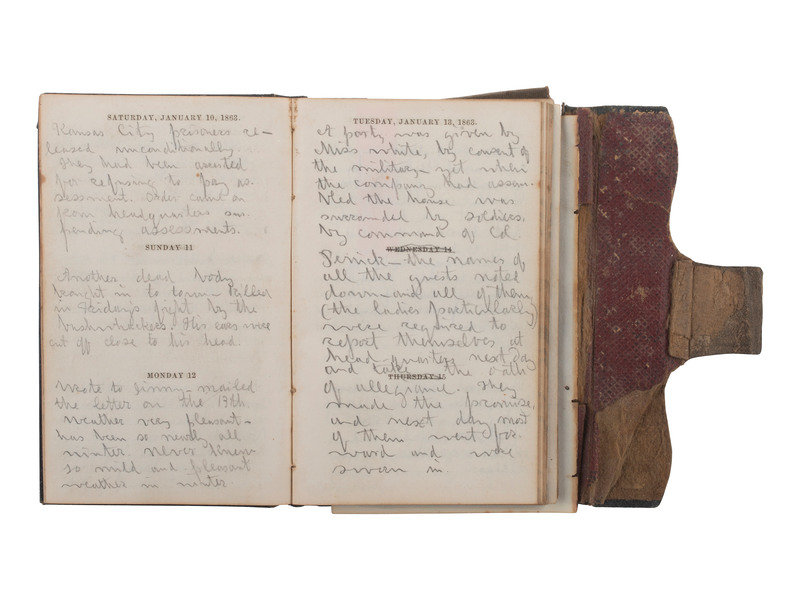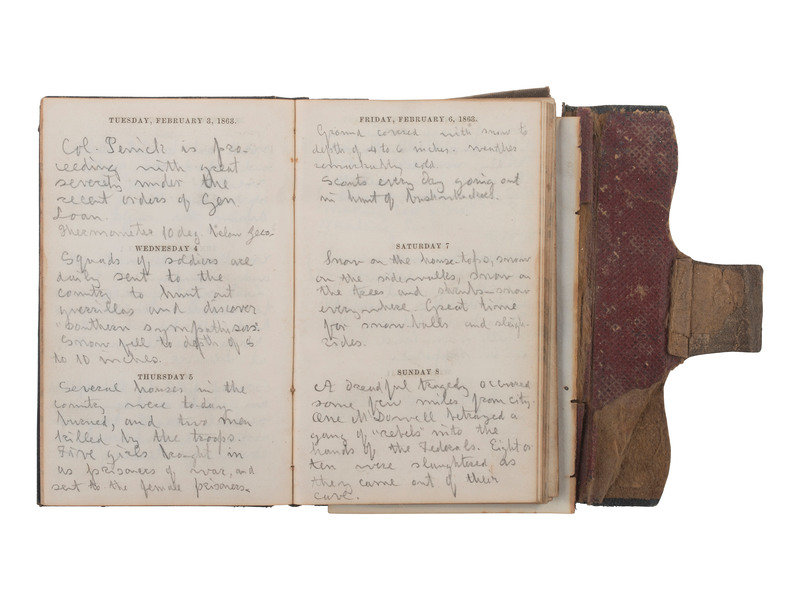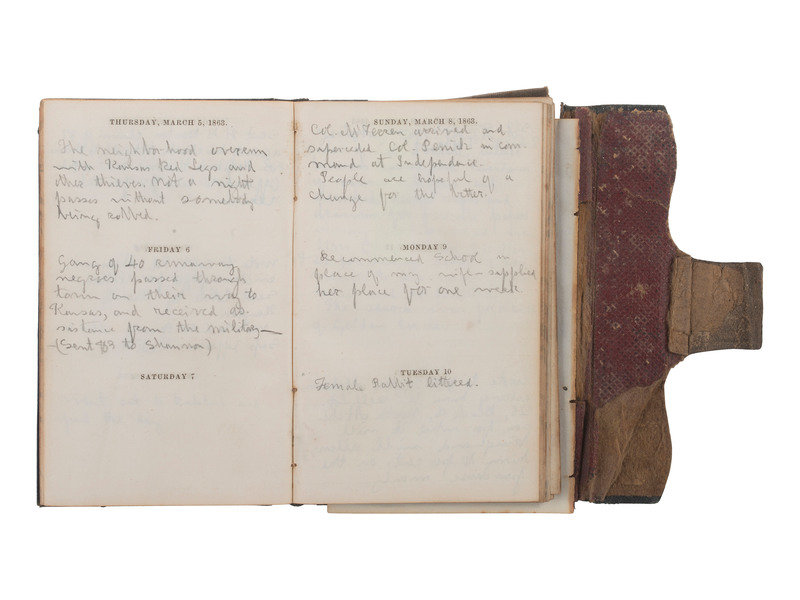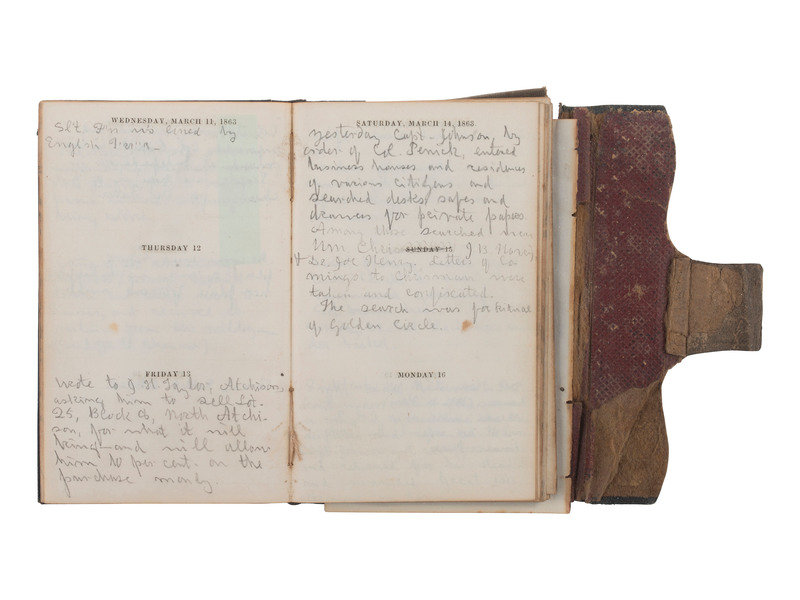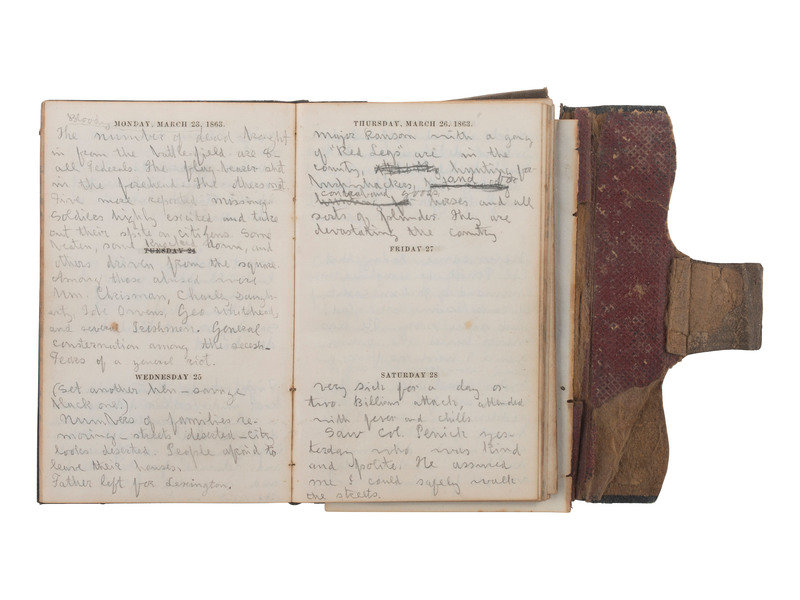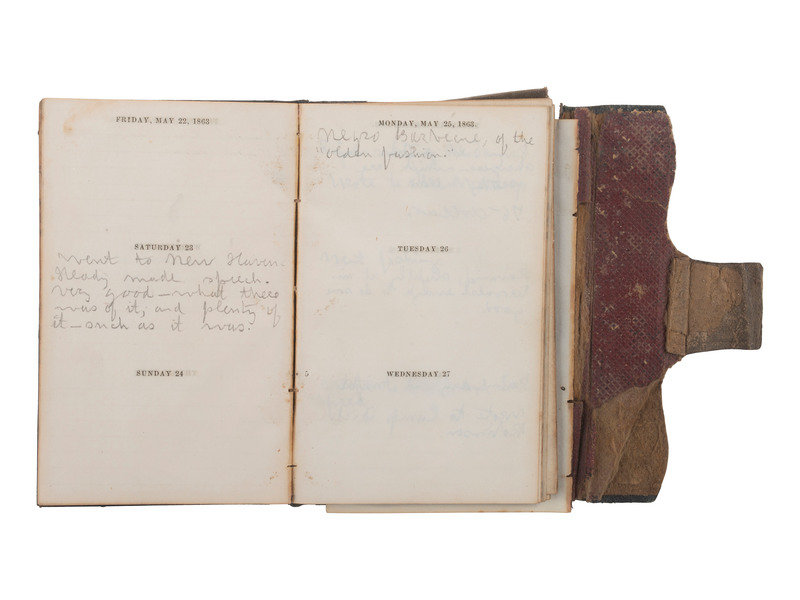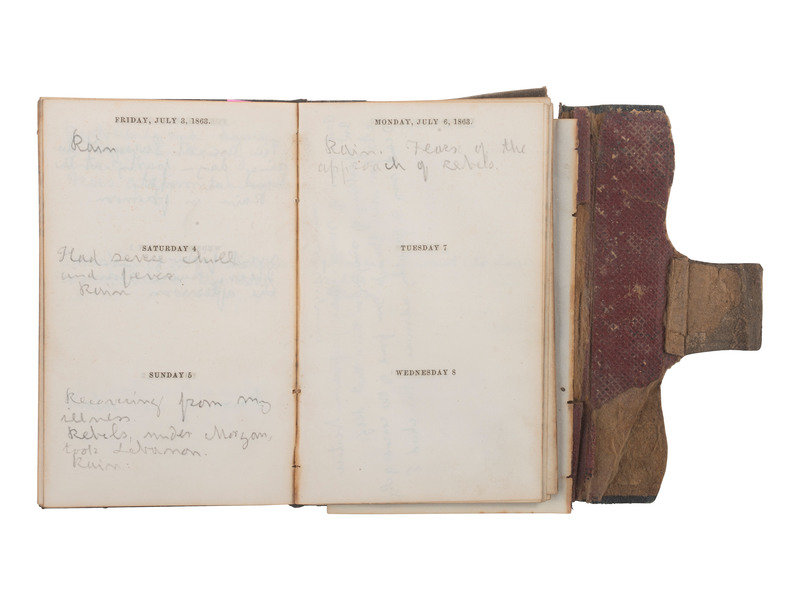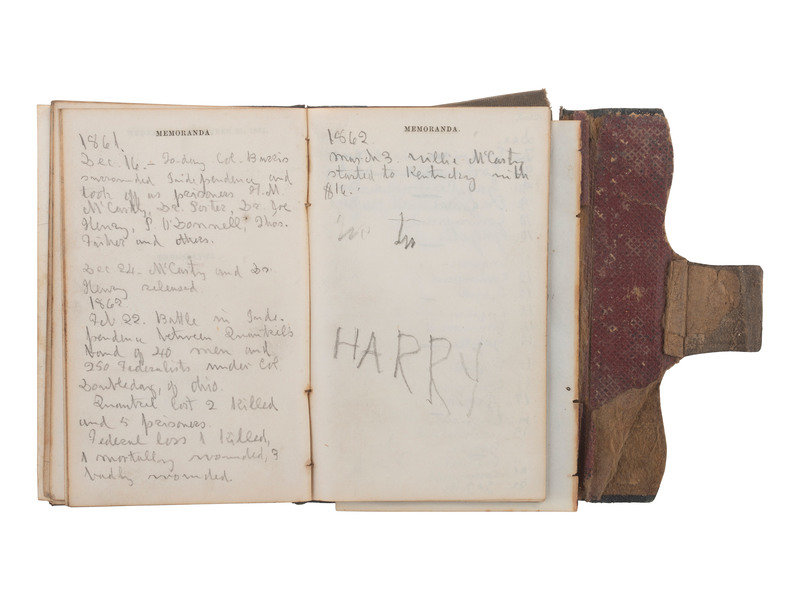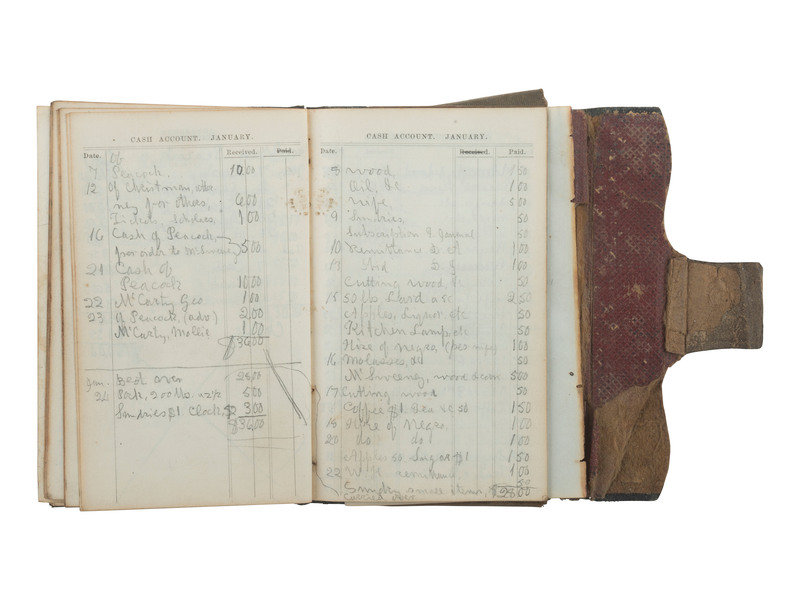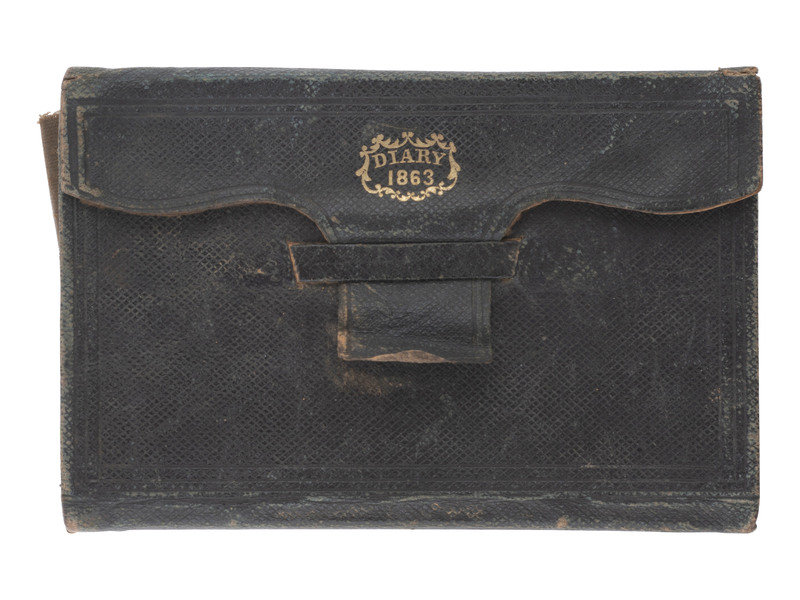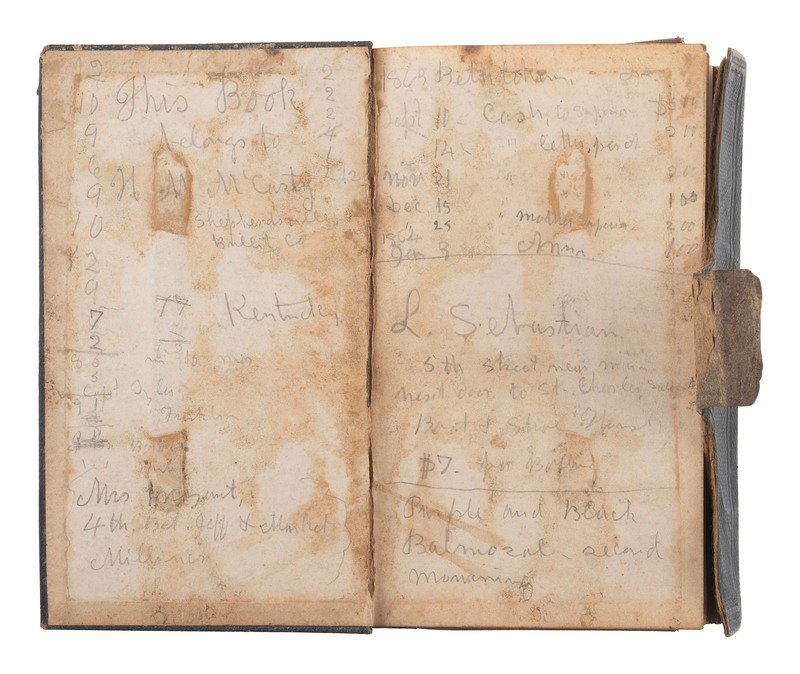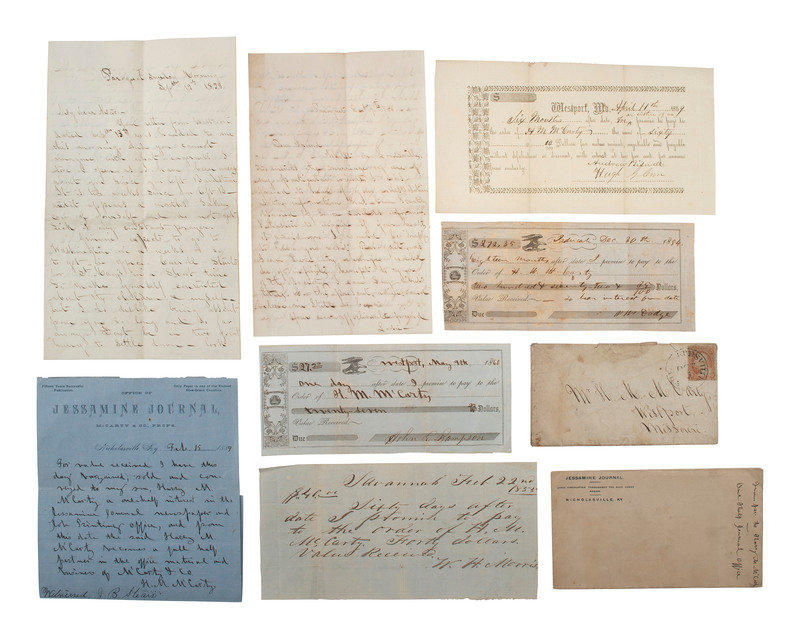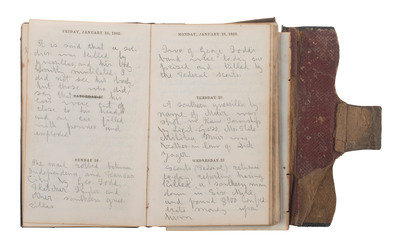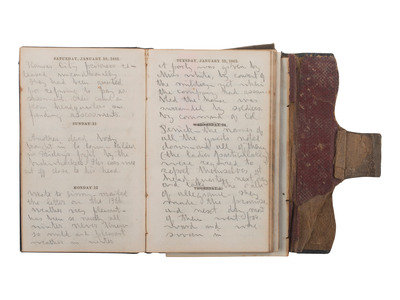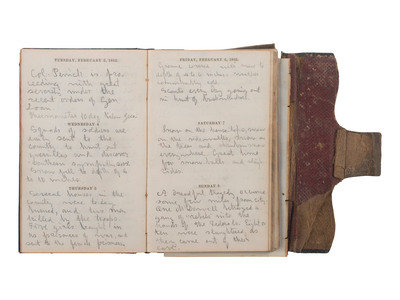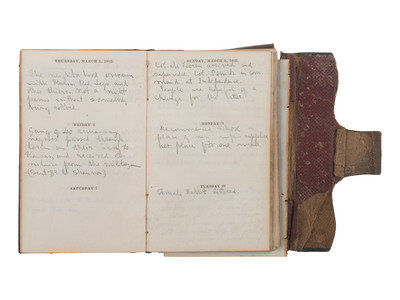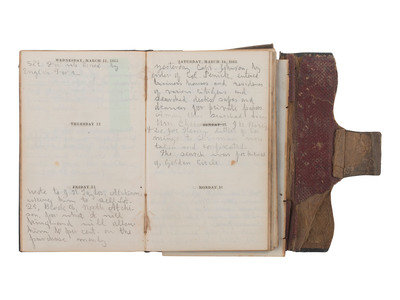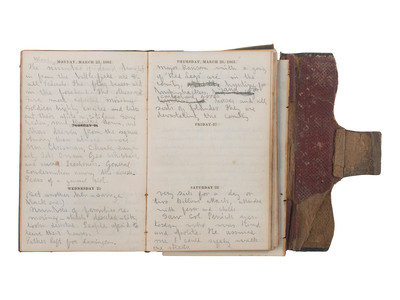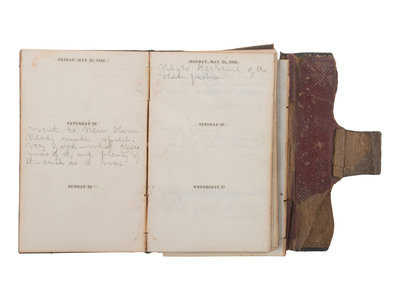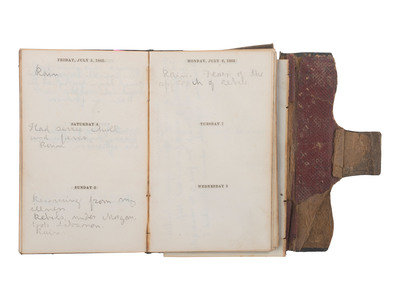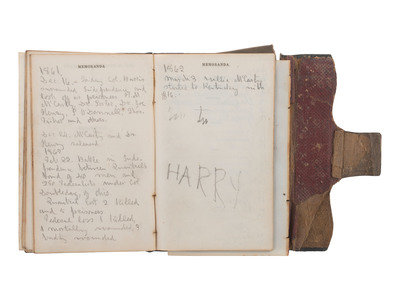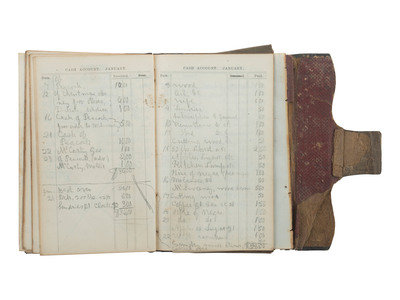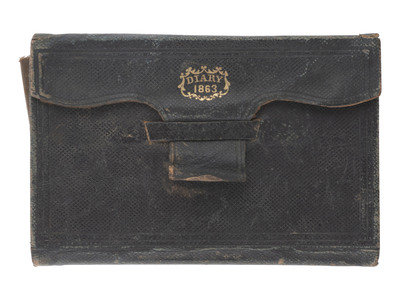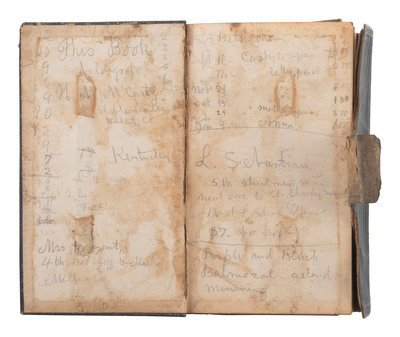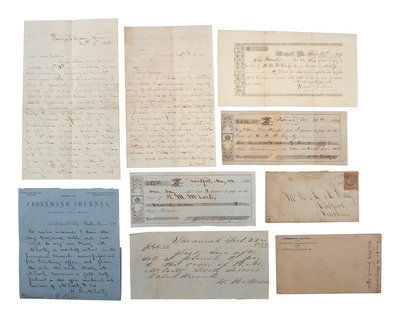Lot 128
[CIVIL WAR] -- [QUANTRILL'S RAIDERS]. Diary of H.M. McCarty, editor of the Border Star at Westport, Missouri, with entries referencing 1863 clashes between Union soldiers and southern sympathizers, guerilla activity, and Quantrill's Raiders.
Sale 1192 - American Historical Ephemera & Photography
Lots 1-294
Jun 15, 2023
10:00AM ET
Lots 295-567
Jun 16, 2023
10:00AM ET
Live / Cincinnati
Own a similar item?
Estimate
$2,000 -
3,000
Price Realized
$4,410
Sold prices are inclusive of Buyer’s Premium
Lot Description
[CIVIL WAR] -- [QUANTRILL'S RAIDERS]. Diary of H.M. McCarty, editor of the Border Star at Westport, Missouri, with entries referencing 1863 clashes between Union soldiers and southern sympathizers, guerilla activity, and Quantrill's Raiders.
3 1/4 x 5 in. leather bound pocket diary with regular entries spanning 1 January 1863 - 26 December 1863, 95pp utilized for jounral entries with 32pp additional content in "Memoranda" and "Cash Account" sections (wear to leather surface especially at spine and closure loop, some dampstaining to pages, scattered pencil marks, loose binding, 1 detached page, missing 1 page Fri Nov 27 - Wed Dec 2).
A FASCINATING ACCOUNT OF GUERILLA WARFARE IN A HOTLY CONTESTED BORDER STATE
During the Civil War, Westport, Missouri, was a small community just on the outskirts of Kansas City, the home to the Union's District of the Border headquarters. Though Kansas City remained under Union control during the war, much of the surrounding countryside harbored a militant pro-southern population resulting in violent conflicts between northern and southern factions in the region. McCarty's diary describes these heightened tensions and the often bloody clashes during a pivotal time in the region, and includes references to Kansas "Red Legs," Quantrill's guerillas, and Union soldiers. Figuring regularly in McCarty's diary is Col. William Ridgeway Penick (1829-1901) of the 5th Missouri State Militia Cavalry. Penick fought on the Union side, serving with his regiment in the area of Independence, MO between August 1862 and June 1863 during which time he dealt extensively with local guerillas. George M. Todd (1839-1864) and (Charles) Fletcher Taylor (ca 1842-1912), Confederate guerillas operating with Quantrill Raiders, are also referenced. Diary content particularly strong from January through March 1863.
Sample entries related to guerilla activity and engagement with Union forces include: January 9, "Fight on prairies between Geo. Todd's guerillas and some Federals. Four dead Federals brought to town, and some wounded; two missing." Janaury 11, "Another dead body brought in to town killed in Friday's fight by the bushwhackers. His ears were cut off close to his head." February 8 "A dreadful tragedy occurred some ten miles from city. One McDonnell betrayed a gang of 'rebels' into the hands of the Federals. Eight or ten were slaughtered as they came out of their cave." March 5, "The neighborhood overrun with Kansas Red legs and other thieves not a night passes without somebody being robbed." March 22 and 23, he describes a particularly deadly encounter and the ensuing violence sparked in town, "Fight today between a Fed. Scout under Captain Johnson, and a gang of guerillas. the Feds dispersed, and retreated to town. Capt Johnson got reinforcements and returned for his dead and wounded. Great excitement in town....The number of dead brought in from the battle field are 8 - all Federals. The flag-bearer shot in the forehead....Soldiers highly excited and take out their spite on the citizens. Some beaten, some knocked down, and others driven from the square...."
McCarty writes regularly of tensions between civilians and Federals. January 25, "Several more arrests of citizens made by the military. One man has been imprisoned for sending his mules across the river for safe keeping." Feb 4 - 5, "Squads of soldiers are daily sent to the country to hunt out guerillas and discover 'southern sympathizers'" then "several houses in the country were today burned, and two men killed by the troops. Five girls brought in as prisoners of war, and sent to the female prisoners." By March 25th tensions are boiling over with McCarty noting that "numbers of families removing - streets deserted - city looks deserted. People afraid to leave their houses." On March 25, McCarty decides that he, too, must leave. He writes: "I have determined to go back to Kentucky. Life not safe here any longer."
McCarty's diary includes numerous other references of interest, such as a March 6 entry "gang of 40 runaway negroes passed through town on their way to Kansas, and received assistance from the military" and a March 14 entry related to the secret society known as the Knights of the Golden Circle, "Yesterday Capt. Johnson by order of Col. Penick, entered business[es] houses and residences of various citizens and seached desks, safes, and drawers for private papers. Among those searched were William Chrisman J.B. Harvey [sp?] & Dr. Joe Henry. Letters of Comingo [?] to Chrisman were taken and confiscated. The search was for ritual of Golden Circle."
The remainder of the diary describes McCarty's return trip to Kentucky, and his efforts to re-estabish himself in the newspaper industry there. He ultimately finds employment as a correspondent for multiple papers based and "engaged at the state capital." Several entries appear to be added at a later date in the rear of the diary, including a brief entry in the "Memoranda" section, stating: "1861 / Dec 16 - Today Col. Burris (?) surrounded Independence and took off as prisoners H.M. McCarty, Dr. Porter, Dr. Joe Henry, P. O'Donnell, Thos. Fisher and others. / Dec 24 McCarty and Dr. Henry released...."
[With:] A group of 9 documents acquired with the diary, most associated with McCarty, including in part: a letter to McCarty from his wife, Lodviska "Lodie" Colmesnil McCarty, written 19 September 1858 shortly after his departure for Westport, MO; two promissory notes made out to H.M. McCarty, while he was in Westport, MO, dating to 11 April 1859 and 9 May 1860; and a bill of sale signed "H.M. McCarty" on "Jessamine Journal, McCarty & Co. Prop's" letterhead whereby H.M. McCarty conveys interest in his newspaper and printing office to his son, Harry M. McCarty, Nicholasville, KY, 15 February 1889, and accompanied by "Jessamine Journal" postal cover.
Harry Milburn McCarty (1822-1892) was considered by some during his day to be one of the most successful and distinguished journalists in Kentucky. Born in Glasgow, Kentucky, his lengthy career commenced with an apprenticeship in January 1838 under Ben J. Webb, an editor and publisher in Bardstown, KY. Over the next two decades, McCarty was involved in the establishment and publication of multiple newspapers, gaining notoriety for his shrewd political assessments. Financial difficulties sent McCarty west in 1858 looking for new opportunities.
The Weekly News-Democrat of Emporia, Kansas, cited McCarty's next enterprise on 23 October 1858, announcing "The Border Star is the title of a new Pro-slavery paper in Westport, Mo....It is published by H.M. McCarty, and is a very creditably gotten up and well edited paper." According to a Filson Historical Society article ("Best of Breed: Col. H. Milburn McCarty as a Country Editor") published by John B. Thomas, Jr. in 1963, early in the Civil War McCarty's Westport home was attacked, his newspaper office destroyed by Federal troops (other accounts suggest it was by Kansas "Jayhawkers"), and he was imprisoned with Confederate sympathizers at Fort Leavenworth. This incident appears to be the one which McCarty references in the "Memoranda" section of the diary, and likely is the reason he is working for publisher William Peacock instead of at the Border Star as his diary opens in Janaury 1863. The Louisville Daily Courier announced another of McCarty's publishing endeavors on 4 May 1866, describing him as "well and popularly known heretofore as the editor of the Bardstown Gazette, the Paducah Journal, and the Missouri Border Star...." McCarty's final entrepreneurial adventure was the purchase of the Jessamine Journal in Nicholasville, Jessamine County, KY, in 1887. He suffered a stroke in his office there and died in 1891, ending the career of a dedicated and indomitable newspaperman.
Condition Report
Contact Information
Auction Specialist
